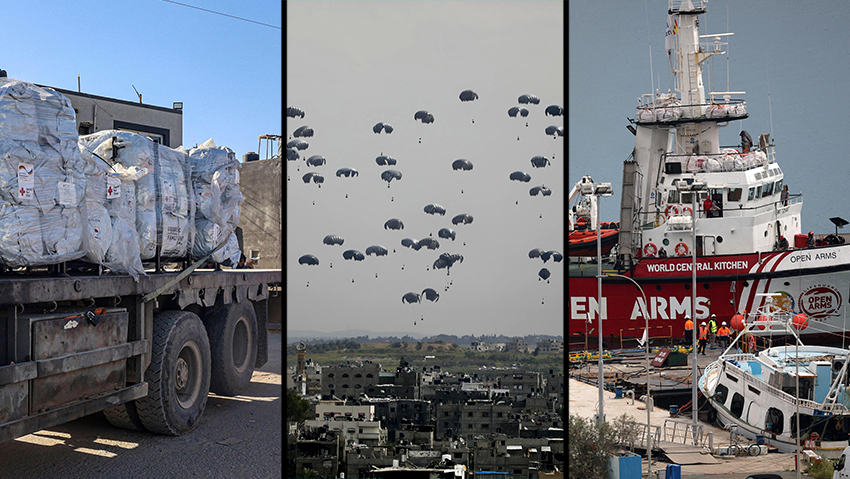Getting your Trinity Audio player ready...
On tables and desks from schools that were converted into shelters, Gazans who became vendors wartime vendors sell second-hand clothes, baby formula, canned goods and also homemade cookies.
Many of those products, the New York Times reports on Sunday, come from foreign aid packages, and instead of the Gazans receiving them for free they are sold at prices that few in the Strip can afford. This is happening while Hamas, seven months after the start of the war, continues to control civilian areas of Gaza.
Humanitarian aid is parachuted into the northern Gaza Strip
Issam Hamouda, 51, sits next to the small number of goods he is offering for sale: canned vegetables and corn from an aid package his family received. "Most of the products found in the markets are labeled 'not for sale'," he says. Before the start of the war he was a driving instructor. Now he supports his family of six children by selling some of the aid they receive every few weeks. "Once I got 4 kilos of dried dates and sold a kilo for 8 shekels," he told the New York Times.
The humanitarian aid is indeed labeled as "not for resale," but some of it - including looted products - often reaches the various markets. "The food aid is dropped or brought in and stolen by armed people like gangs," says Majeda Abu Eisha, a 49-year-old mother of 10.
Erez Crossing is opened for the introduction of humanitarian aid to Gaza
(צילום: דובר צה"ל )
According to her, while trying to get aid, her son and nephew were shot and injured by Israeli soldiers. They were unable to get the aid. "The winner in this battle is the armed one who can get whatever he wants from the aid," Eisha said. "Anyone who is not armed or strong enough to fight and push in goes home empty-handed."
The Times reports that a kilogram of sugar recently was sold in the markets in Rafah for 7 shekels. The next day, Hamas fired dozens of rockets into Kerem Shalom, and the crossing was closed. In the hours that followed, the price jumped to 25 shekels. A day later it dropped slightly to 20 shekels.
"The same item can be sold for different prices in the same market," said Sabah Abu-Ghanem, 25. "When the police are there, traders will sell things for the prices the police decide. When the police leave, prices go up immediately."
1 View gallery


Aid is brought into Gaza by land, air and sea
(Photos: Said Khatib/ AFP, Yiannis Kourtoglou/Reuters, Mohammed Hajjar/AP )
The residents say that officials affiliated with the Hamas-run government are present in some capacity, especially in the southern Gaza Strip. Although some Gazans said that the Hamas police were trying to prevent traders from trying to raise prices and profit from the war, others accused Hamas of actually being the one profiting from the looting of the aid.
Hamouda said that the aid he and his family occasionally receive comes from the Ministry of Social Development, which is operated by Hamas, and oversees the welfare programs in Gaza. He said that various products are sometimes missing from the packages, such as sugar, dates and cooking oil. The "missing" products are sold at much higher prices in the markets.
Hamas denied the claims. "The accusations that the government in Gaza is stealing aid are false," a Hamas official told the Times.





